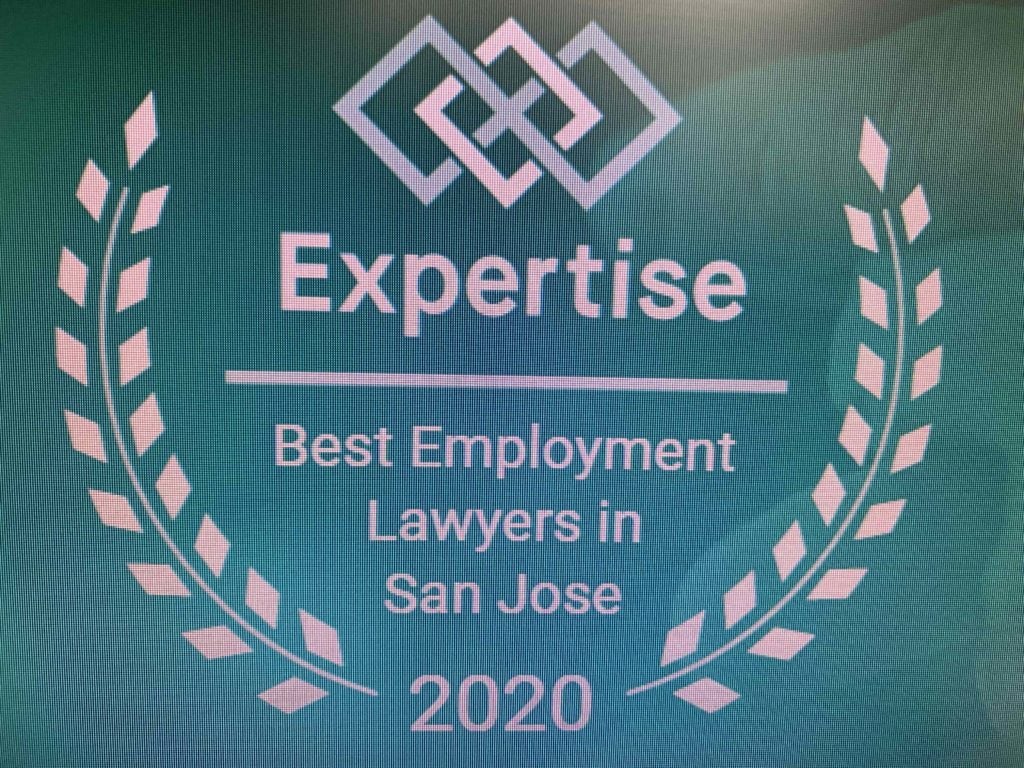-
Covid-19 Unemployment Benefits in San Jose
As a result of the Covid-19 pandemic, you may qualify for extended unemployment insurance benefits, and enhanced protections from employer discrimination. If you believe that you or someone you know has been wrongfully fired due to actual or suspected infection, civil rights violations may have occurred, where the law is designed to protect the public from actual or perceived medical condition discrimination or disability discrimination. It is best to consult a qualified employment lawyer to be best advised if you suspect your rights have been violated.
If you’re in San Jose and need an attorney you can depend on to fight your case, contact Advocacy Center for Employment Law.

-
Top Employment Lawyer in San Jose
Recently, ThreeBestRated.com identified Steven P. Cohn as a leading provider in the field of employment law in San Jose. Based on reviews and testimonials, the company determined that Mr. Cohn stood out from other attorneys, and duly selected him as one of the top three employment lawyers in San Jose. Mr. Cohn has more than
 35 years of legal experience and specializes in workplace discrimination and harassment, disability, whistleblowing, unlawful business practices, and wrongful termination . Congratulations on the recognition, Mr. Cohn!
35 years of legal experience and specializes in workplace discrimination and harassment, disability, whistleblowing, unlawful business practices, and wrongful termination . Congratulations on the recognition, Mr. Cohn!If you have benefitted from Mr. Cohn’s legal expertise, please leave a review on our Google+ page. We appreciate your feedback!
-
A Guide to Your Rights as a Minimum Wage Worker
The Fair Labor Standards Act governs employment law in San Jose through federal minimum wage provisions. As of July 24, 2009, the federal minimum wage is $7.25 per hour. However, many states have their own minimum wage laws, with some states providing greater employee protections.
 1. Covered Employees
1. Covered Employees The Fair Labor Standards Act establishes minimum wage, overtime pay, and child labor standards throughout the country. While states can implement a higher minimum wage, they must also comply with the federal minimum wage standards. The employment law provisions of the FLSA apply to businesses with employees who participate in interstate commerce, produce goods for interstate commerce, or work with goods that have been moved in or produced in the stream of interstate commerce. However, the Act does not regulate hospitals, institutions engaged in the care of sick, schools, or institutions of higher education. As a result, these types of employees must file their wage claims under other legal remedies.
2. Basic Provisions
The Act requires covered employers to compensate their employees a minimum wage of $7.25. Additionally, employers cannot pay workers under the age of 20 less than $4.25 an hour during the first 90 consecutive calendar days of employment. It is also illegal for an employee to displace a separate employee to hire a youth worker. Even though employers may pay on a piece-rate basis, employees can file hour claims if they don’t receive the equivalent of the required minimum hourly wage rate and overtime. While the Act does not limit the number of overtime hours an employee can work, it does require employers to compensate employees at least one and one-half times their regular pay rate for overtime pay.
3. Penalties and Sanctions
An employee can speak with an employment attorney about FSLA violations, but the Department of Labor also uses a variety of remedies to enforce compliance with the Act. If the Wage and Hour Division Investigators notice violations, they will recommend changes in employment practices so that the employer is in compliance with the Act. They will also require employers to pay employees for any back due payments.
-
Employee Misclassification: Are You a Victim?
In 2011, Levi Strauss made national news when the company agreed to pay more than one million dollars in back wages to employees it misclassified as exempt from overtime pay. Unfortunately for a non-exempt employee in San Jose , many companies struggle with the definition of exempt and non-exempt employees. While the rules governing this type of employment law are complex, the practical implications of these classifications are rather straightforward.
 1. Tests for classification
1. Tests for classification The Federal Labor Standards Act outlines three tests for classifying an exempt employee and a non-exempt employee. In most cases, the employee must satisfy all three tests to meet the definition of exempt. First, an employee is considered exempt if he or she earns more than $100,000 per year. Employees earning less than $23,600 per year are classified as non-exempt. The second requirement is the salary basis test, which classifies employees as salaried if they receive a guaranteed minimum amount of money for weekly work. The final test is the duties test, which looks at the actual job tasks and how the position fits into the employer’s overall operations.
2. Reclassification of employees
Identifying misclassified employees is just the first step in solving this employment law issue. The employer needs to calculate a new hourly wage rate and compensate the employees for any overtime wages owed. If the employee salaries were already quite high, it may be difficult to convert those to an hourly rate that isn’t considerably higher than competitive market rate. In this type of situation, it may be useful to meet with an employment attorney about reclassifying employees and providing compensation for back wages.
3. Management training
Employers may need to meet with an employment attorney to calculate the amount due to each misclassified employee and benchmark a competitive new hourly rate. This ensures that the affected employees don’t earn any less than they did with their exempt statuses. Next, employers should train managers on workplace rights for hourly employees and how to educate their employees on rights regarding overtime wages. An attorney can help the employer reach a settlement for back pay with the affected employees.
-
What to Do If You Were Fired Without Cause?
If you are the victim of wrongful termination near San Jose, you need to meet with an employment attorney to determine whether or not your employer was able to terminate you without cause. California is an “at-will” employment state, but this generalization does not apply in every employment situation. If you and your employer agreed that you would work for a certain period of time, employment law typically requires your employer to provide cause for termination.
 Government employees as well as employees in a union also require cause for termination, even if they are at-will employees. In addition, termination due to sexual harassment or whistleblower retaliation is also exceptions to the “at-will” employment law doctrine. An employee may also file a wrongful termination claim if his or her termination was retaliation for requesting overtime pay. The best way for a terminated employee to assess the validity of his or her wrongful termination claim is by meeting with an employment lawyer. The employment attorney can determine whether the circumstances surrounding the termination fall into one of these “at-will” employment exceptions.
Government employees as well as employees in a union also require cause for termination, even if they are at-will employees. In addition, termination due to sexual harassment or whistleblower retaliation is also exceptions to the “at-will” employment law doctrine. An employee may also file a wrongful termination claim if his or her termination was retaliation for requesting overtime pay. The best way for a terminated employee to assess the validity of his or her wrongful termination claim is by meeting with an employment lawyer. The employment attorney can determine whether the circumstances surrounding the termination fall into one of these “at-will” employment exceptions. -
A Look at Employment Discrimination Laws
 Employees and prospective employees are protected from discriminatory actions taken by employers and co-workers. These protections are guaranteed by state laws such as California’s Fair Employment and Housing Act, and federal laws such as the Federal Civil Rights Act of 1991. Any employee has the right to consult an employment lawyer if he or she feels that a discriminatory action has taken place. A labor law attorney near San Jose can help you understand the applicable laws, investigate your case, and provide guidance with regard to your legal options.
Employees and prospective employees are protected from discriminatory actions taken by employers and co-workers. These protections are guaranteed by state laws such as California’s Fair Employment and Housing Act, and federal laws such as the Federal Civil Rights Act of 1991. Any employee has the right to consult an employment lawyer if he or she feels that a discriminatory action has taken place. A labor law attorney near San Jose can help you understand the applicable laws, investigate your case, and provide guidance with regard to your legal options. 1. Basis for Discrimination
The U.S. Equal Employment Opportunity Commission (EEOC) enforces employment law, which prohibits discrimination on the basis of a wide range of characteristics. For instance, it is prohibited for an employer to discriminate against an employee on the basis of age, disability, or national origin. Likewise, discrimination on the basis of genetic information, race, color, religion, sex, and pregnancy is also illegal. If you’re unsure of whether a behavior you’ve experienced falls into one of these categories, consult your employment lawyer.2. Equal Pay for Equal Work
Another aspect of employment discrimination laws involves equal pay for equal work . Under the Equal Pay Act, men and women who work within the same company and carry out equal work must receive equal pay. Equal pay involves salary, bonuses, stock options, overtime pay, life insurance, travel reimbursement, and all other forms of financial compensation. Equal work is not necessarily defined by a person’s job title, but rather by the job responsibilities. For example, if Joan is a secretary to an executive at a company and John is an executive assistant at the same company, and both individuals carry out substantially similar job responsibilities, then it would be a violation of the Equal Pay Act for Joan to receive less compensation than John.3. Retaliatory Actions for Claims
Under employment law, it is illegal for an employer to take retaliatory action against an employee who has filed a claim of discrimination or has reported discrimination. Some examples of illegal acts of retaliation include wrongful termination, demotions, harassment, and refusal to promote. -
Attorney Spotlight: Steven Paul Cohn
 Steven Paul Cohn is an employment lawyer who is dedicated to providing San Jose residents with exceptional legal representation. He has been practicing law since 1980, and in 1994, he founded the Advocacy Center for Employment Law. If you’re in need of a labor attorney in San Jose, you can find the expertise you need at our law firm. Our team thoroughly investigates complaints related to civil rights violations, unfair business practices, and sexual harassment. Mr. Cohn also handles cases related to all other aspects of employment law, including complaints of discrimination because of gender, age, and disability.
Steven Paul Cohn is an employment lawyer who is dedicated to providing San Jose residents with exceptional legal representation. He has been practicing law since 1980, and in 1994, he founded the Advocacy Center for Employment Law. If you’re in need of a labor attorney in San Jose, you can find the expertise you need at our law firm. Our team thoroughly investigates complaints related to civil rights violations, unfair business practices, and sexual harassment. Mr. Cohn also handles cases related to all other aspects of employment law, including complaints of discrimination because of gender, age, and disability. At the Advocacy Center for Employment Law, we believe our results speak for themselves; however, we invite you to explore the credentials of our employment lawyer. Mr. Cohn demonstrates his commitment to professional development by authoring numerous publications in the field, serving as a continuing education lecturer, and serving as a guest speaker at employment law symposiums. In addition to serving as a law professor at the University of Santa Clara, he is also an American Arbitration Association Arbitrator. Mr. Cohn has received numerous recognitions for his dedication to excellence, including being designated as the 1992 California State Bar Wiley W. Manual Award recipient. This award recognizes lawyers who provide outstanding legal representation on a pro bono basis.
-
Tips for Hiring an Employment Lawyer
 There are many reasons why you might require a labor attorney in San Jose. An employment lawyer can help you before you’ve been hired by reviewing contracts before you sign them. An employment lawyer can also help you after you’ve been hired by assisting you with problems such as wrongful termination and workplace discrimination, in addition to negotiating severance agreements. These tips will help you identify the best employment lawyer in San Jose.
There are many reasons why you might require a labor attorney in San Jose. An employment lawyer can help you before you’ve been hired by reviewing contracts before you sign them. An employment lawyer can also help you after you’ve been hired by assisting you with problems such as wrongful termination and workplace discrimination, in addition to negotiating severance agreements. These tips will help you identify the best employment lawyer in San Jose. 1. Request Referrals
Talk to friends and family members who have had problems in the workplace and have sought the help of a labor attorney. Ask them if they would recommend the employment lawyer they worked with. Otherwise, you can compile a list of labor attorneys near you by checking the state or local bar association.2. Evaluate Background and Expertise
Check the websites of employment lawyers near you to read about their backgrounds and expertise. Select a lawyer who has been practicing employment law for years and is well-versed in the intricacies of civil rights violations, employment harassment, unfair business practices, and any other area relevant to your situation. The attorneys’ biographies may mention their professional associations and recognition. You may wish to select a lawyer who has demonstrated a commitment to ongoing professional development, such as by authoring publications on employment law, serving as a law professor, or participating in mediation and arbitration services.3. Bring Relevant Documents
You can prepare for your initial consultation with the employment lawyer by compiling any relevant documents. You might bring past performance reviews, severance agreements, employment contracts, and relevant office memos, for example. If you’ve been the victim of employment harassment, bring any evidence you might have for these incidents, such as a written log of all discriminatory behaviors.4. Discuss Strategies
Before deciding to hire the employment lawyer, ask him or her how the case should be handled and then decide whether you’re comfortable with that approach. Additionally, be sure to ask the lawyer if he or she charges on a contingency basis or offers a flat fee. -
Understanding Wrongful Termination and Your Rights
1. Understanding Wrongful Termination and Your Rights
If you’ve recently been fired and you feel the action was unjust, you may wish to consider consulting an employment lawyer to determine whether you were the victim of wrongful termination. As your labor law attorney near San Jose can explain to you, most jobs are based on at-will employment. This means that as long as an employee is not fired for an illegal reason, an employer may fire him or her without having a good reason or even having a reason at all. Your employment lawyer can identify exceptions to this rule and file a complaint on your behalf if you were indeed wrongfully terminated.
2. Contracts
You may not be an at-will employee if you signed a written contract when you took the job. Your wrongful termination lawyer can review your contract to determine if there is a clause that spells out legitimate reasons for the firing. However, even if you lack a written contract, you may be able to prove wrongful termination based on an implied contract. An implied contract occurs when your employer says something or acts in a manner so as to make you believe that you can continue your employment for a certain period of time.
3. Good Faith
You may have grounds for a wrongful termination complaint if your employment lawyer determines that your employer may have breached the duty of good faith and fair dealing. For example, your employer may have fired you to prevent you from collecting sales commissions. Or, you may have been repeatedly transferred to dangerous or undesirable assignments in an attempt to force you to quit before you could collect benefits.
4. Public Policy
Violations of public policy can vary from state to state. For example, you might be protected from being fired because you volunteer as a firefighter. You are also protected from termination because of whistleblowing, taking time off to vote or serve on a jury, and serving in the military or National Guard.
5. Discrimination
Wrongful termination because of discrimination is another reason to consult an employment lawyer. If you feel you were fired because of your gender, religion, age, disability, race, color, national origin, or pregnancy status, your lawyer can file a complaint with the appropriate agency and then help you file a lawsuit against your employer.
-
Attorney Spotlight: Steven Paul Cohn
Attorney Spotlight: Steven Paul Cohn
 Steven Paul Cohn is an employment lawyer who is dedicated to providing San Jose residents with exceptional legal representation. He has been practicing law since 1980, and in 1994, he founded the Advocacy Center for Employment Law. If you’re in need of a labor attorney in San Jose, you can find the expertise you need at our law firm. Our team thoroughly investigates complaints related to civil rights violations, unfair business practices, and sexual harassment. Mr. Cohn also handles cases related to all other aspects of employment law, including complaints of discrimination because of gender, age, and disability.
Steven Paul Cohn is an employment lawyer who is dedicated to providing San Jose residents with exceptional legal representation. He has been practicing law since 1980, and in 1994, he founded the Advocacy Center for Employment Law. If you’re in need of a labor attorney in San Jose, you can find the expertise you need at our law firm. Our team thoroughly investigates complaints related to civil rights violations, unfair business practices, and sexual harassment. Mr. Cohn also handles cases related to all other aspects of employment law, including complaints of discrimination because of gender, age, and disability.At the Advocacy Center for Employment Law, we believe our results speak for themselves; however, we invite you to explore the credentials of our employment lawyer. Mr. Cohn demonstrates his commitment to professional development by authoring numerous publications in the field, serving as a continuing education lecturer, and serving as a guest speaker at employment law symposiums. In addition to serving as a law professor at the University of Santa Clara, he is also an American Arbitration Association Arbitrator. Mr. Cohn has received numerous recognitions for his dedication to excellence, including being designated as the 1992 California State Bar Wiley W. Manual Award recipient. This award recognizes lawyers who provide outstanding legal representation on a pro bono basis.
